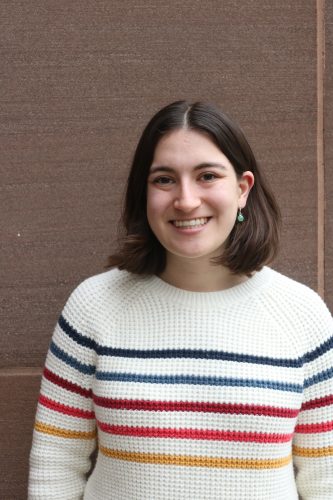Image courtesy of Michelle Barsukov.
For Maddie Bender (TD ’20), it all started with chess.
Growing up, she was a competitive player of the game, which takes place in a notoriously majority-male arena. Bender, however, never minded being the only girl. Her willingness to stand out endured as she grew older and became interested in STEM, another male-dominated field. Rather than hold her back, her unique position propelled her to pursue science even more. “I felt like if I was comfortable in those spaces, then I should do it, on behalf of all the other people who would love to see a woman in that field,” Bender recalled. Now an aspiring science journalist, Bender has always loved to break molds.
In high school, Bender realized she was interested in not only science, but also the humanities, taking a variety of classes in both areas. She was never sure how to combine these interests until her junior year of high school. “I was listening to [the podcast] Radiolab, the first of a two-part series on CRISPR-Cas9 genome editing, and they had [science writer and Yale professor] Carl Zimmer on to explain how that gene editing works,” Bender said. “As I was listening to him… I realized that I didn’t even know someone could have that job of taking science and explaining it to non-scientists.”
Inspired by that moment, Bender came to Yale certain she wanted to pursue a combination of biology and humanities, going as far as to create a four-year plan her freshman year. She quickly decided to double major in Ecology and Evolutionary Biology and Classics. Her freshman counselor and everyone else around her told her, “You’re not going to stick to it.” As always, Bender was the exception.
Bender joined the Yale Daily News her freshman year, and by sophomore year was editor of the Science and Technology desk. She has honed her skills during various internships, including a coveted one at CNN. Bender is particularly proud of a feature she wrote for CNN about technology overuse. “I had a very intense conversation with a girl who was trying to take a step back from technology and social media because she was aware of how it was negatively affecting her life. I thought it was really important to share her story,” Bender said.
Bender has also grown her writing skills through other publications. She previously interned at Wow in the World, an NPR science podcast targeted toward younger children. Today, she is an assistant editor at Massive Science, a publication where scientists can write about the topics they know best for a non-scientist audience. And since August, she has published weekly articles for Vice about fascinating topics that range from evolution to climate change to gene editing.
Bender has also spent two years conducting research on bacteria at the Sanchez lab, which researches microbes on Yale’s West Campus. While she loves the work she does, she does not view it as a future career path. “I don’t think I could focus on a very niche, minute topic for years and years. It’s much more exciting to get to go in at the point of discovery, when in reality the scientific process is years and years of not necessarily exciting discoveries,” Bender explained.
When asked about challenges in science journalism, Bender acknowledges that, just like in her chess-playing days, it can be difficult to fit in. “Being a young-ish woman in a science-adjacent field, I haven’t always felt taken seriously by people who are established in the field,” she said. This feeling of isolation is echoed, although to a lesser degree, in her journalism community, “because I don’t plan on going to journalism school and because I’ve only really wanted to do science up until this point,” Bender said.
But, none of these challenges faze her. Bender is currently pursuing a Master of Public Health degree in the epidemiology of microbial diseases through a prestigious five-year BS/MPH program at the Yale School of Public Health. After graduating, she is determined to go into science writing full time, though she is unsure whether that will be as a full-time journalist or as a freelancer.
Despite all the challenges that come from constantly pursuing the path less traveled, nothing will dim Bender’s passion for science journalism. “I love the idea of taking something so specialized it’s almost in another language, something so jargon-y, and just translating it so it can be accessible to anyone,” she said.

